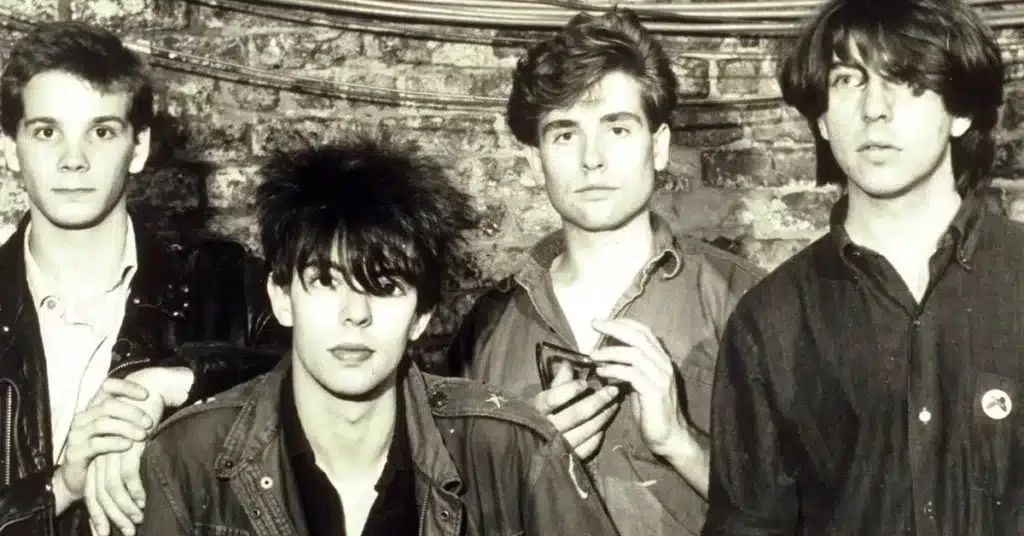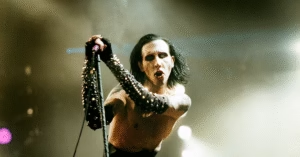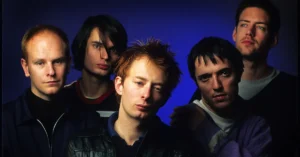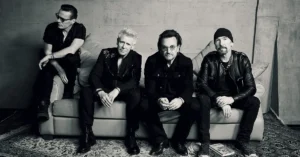Echo & the Bunnymen: Post-Punk Dreamscapes from Liverpool
Echo & the Bunnymen. Origins in the Shadows of Punk (1978–1980)
Echo & the Bunnymen formed in Liverpool, England, in 1978, during the post-punk explosion that followed the raw intensity of punk. The original lineup included:
- Ian McCulloch – vocals
- Will Sergeant – guitar
- Les Pattinson – bass
- Pete de Freitas – drums (joined 1980)
In their earliest incarnation, the band used a drum machine, humorously nicknamed “Echo,” which sparked rumors that the band’s name referred to a machine. In truth, “Echo” was never a real band member, nor was the name intended to refer to a specific entity—it simply sounded evocative and mysterious, in line with their atmospheric sound.
Their first official performance took place in 1978, sharing a bill with Joy Division. They quickly attracted attention for their moody, swirling sound and McCulloch’s enigmatic stage presence.
Echo & the Bunnymen. The Emergence of a Unique Sound (1980–1984)
Crocodiles (1980)
Echo & the Bunnymen’s debut album Crocodiles landed in the UK Top 20 and was lauded by critics. The band’s sound—a blend of post-punk sharpness and psychedelic melancholy—was already refined. Songs like “Rescue” and “Pictures on My Wall” presented a dark romanticism and haunting guitar textures that would define their early period.
Heaven Up Here (1981)
Their second album took a deeper dive into introspective terrain. Produced by Hugh Jones, Heaven Up Here was more atmospheric and emotionally intense, with standout tracks like “Over the Wall” and “A Promise.” Though less commercial, it showcased the band’s ambitions and complexity and went on to win critical acclaim, even earning a spot in Rolling Stone’s 500 Greatest Albums of All Time.
Porcupine (1983)
This record pushed their mystique to grander scales, featuring string arrangements by Indian violinist Shankar. The album’s tone was icy and brooding, with soaring guitar work and a sense of desperation. The single “The Cutter” became a UK hit, and the album cemented their status as one of the UK’s premier alternative bands.
Ocean Rain (1984)
This is widely regarded as Echo & the Bunnymen’s masterpiece. With lush orchestration and a sweeping cinematic feel, Ocean Rain was recorded with a 35-piece orchestra and boasted the now-classic single “The Killing Moon,” a song often praised for its haunting beauty and symbolic lyricism. McCulloch famously declared it “the greatest song ever written.”
Other standout tracks include “Silver”, “Seven Seas”, and “Nocturnal Me”, all of which contribute to the album’s status as a shimmering jewel of 1980s alternative music.
Setbacks, Success, and Change (1985–1990)
After Ocean Rain, the band faced growing tensions and personal struggles. Drummer Pete de Freitas, a central creative force, left the band temporarily and later returned. In 1985, they released the standalone single “Bring On the Dancing Horses,” which became another hit and was later included in the Pretty in Pink soundtrack.
Their 1987 self-titled album Echo & the Bunnymen was produced by Laurie Latham and was their most commercially polished record. While it included successful singles like “Lips Like Sugar” and “Bedbugs and Ballyhoo,” it also marked the end of an era.
Tragically, in 1989, Pete de Freitas was killed in a motorcycle accident. His death deeply impacted the band’s cohesion and direction.
Post-McCulloch Era and Decline (1990–1993)
McCulloch left the band in 1988, and the remaining members continued with new singer Noel Burke, rebranding briefly as Electrafixion. They released the album Reverberation (1990), which failed to impress fans or critics. This era is generally considered a low point for the band, and they quietly disbanded soon after.
Resurrection and Second Wave (1997–2005)
In the mid-90s, McCulloch and Sergeant began performing together again, first as Electrafixion, then reviving the Echo & the Bunnymen name by 1997.
Evergreen (1997)
This successful comeback album was both critically and commercially well-received, containing the single “Nothing Lasts Forever,” which returned the band to the UK Top 10. The album showed that the Bunnymen could still deliver emotionally resonant and musically rich work.
Subsequent albums included:
- What Are You Going to Do with Your Life? (1999) – A more reflective and stripped-down album.
- Flowers (2001) – A return to lush arrangements and melancholic tone.
- Siberia (2005) – Produced by Hugh Jones, it recaptured some of their early 80s essence.
Continued Legacy and Modern Works (2006–Present)
Echo & the Bunnymen have remained active, performing regularly and maintaining a loyal fan base. They released:
- The Fountain (2009) – A brighter, more pop-oriented album.
- Meteorites (2014) – Described by McCulloch as a deeply personal album about spirituality.
- The Stars, The Oceans & The Moon (2018) – A collection of reimagined versions of classic songs, performed with new arrangements and orchestration.
Even as trends in music shift, Echo & the Bunnymen’s ethereal sound and poetic lyricism continue to resonate with new generations.
Echo & the Bunnymen. Style and Influence
Echo & the Bunnymen are often associated with post-punk, neo-psychedelia, and , but their sound defies easy categorization. Their music is cinematic, layered, and emotionally rich. Hallmarks of their sound include:
- Will Sergeant’s shimmering, textured guitar work
- Ian McCulloch’s baritone vocals and poetic, cryptic lyrics
- Brooding bass lines and sophisticated arrangements
- Themes of love, mortality, mysticism, and existential yearning

They influenced countless artists including:
- Interpol
- Coldplay
- The War on Drugs
Their atmospheric style helped shape the sound of alternative rock from the 1980s onward.
Echo & the Bunnymen. Key Albums
| Album | Year | Notable Tracks |
| Crocodiles | 1980 | “Rescue,” “Villiers Terrace” |
| Heaven Up Here | 1981 | “Over the Wall,” “A Promise” |
| Porcupine | 1983 | “The Cutter,” “Back of Love” |
| Ocean Rain | 1984 | “The Killing Moon,” “Silver,” “Seven Seas” |
| Echo & the Bunnymen | 1987 | “Lips Like Sugar,” “Bedbugs and Ballyhoo” |
| Evergreen | 1997 | “Nothing Lasts Forever,” “I Want to Be There” |
Echo & the Bunnymen. Fun and Unique Facts
- “The Killing Moon” was partially written in a dream. McCulloch claimed the lyrics came to him subconsciously and he simply wrote them down after waking.
- The band’s name has often sparked speculation. Some think it references an unused character or concept, but it was ultimately a random and evocative phrase.
- Their orchestral album Ocean Rain was promoted with the bold tagline: “The Greatest Album Ever Made.”
- Pete de Freitas, while known for his drumming, was also an accomplished pianist and composer.





